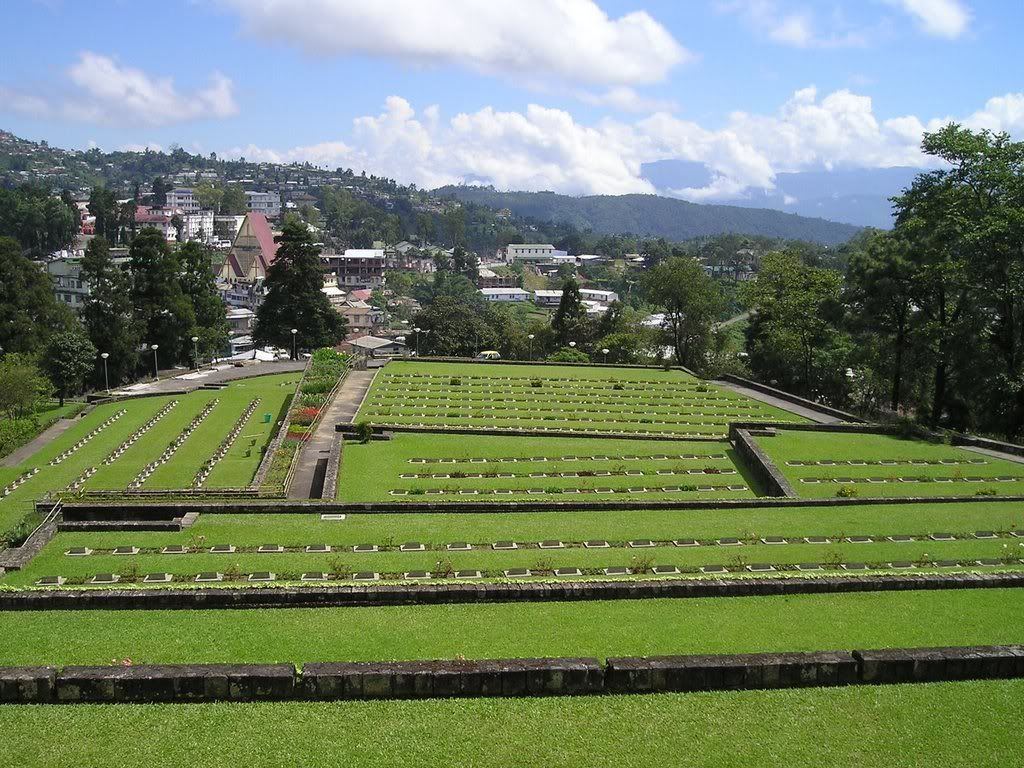http://www.bharat-rakshak.com/LAND-FORCES/History/WW2/70-Glimpses.html
July 10, 1944. 5th Maratha Regiment's Yeshwant Ghadge, all of 22, was caught in a mortal combat in the Upper Tiber Valley of Italy. Except for his commander, his platoon had been wiped out by enemy machine-gunners. With no alternative left, Ghadge rushed the machine gun nest, lobbing grenades, knocking off the gun and the gunner. He charged, shot another enemy. With no time to change his magazine, Ghadge clubbed to death two remaining enemy gunners. Ghadge finally fell to an enemy sniper.
India's memories of the World War II are made of such tales of exceptional valour, was India's biggest and worst war.
Umrao Singh had held onto an advanced gun position against four assaults by Japanese troops.
Despite injuries from two grenade attacks, Singh fought on. When he was discovered hours later, bodies of 10 Japanese were lying around him.
Though the war was not India's, Indians were among the most heroic, borne out by the fact that they won over 4,000 gallantry awards, among them almost 20 Victoria Crosses.
Abdul Hafiz, 9th Jat Infantry, of the British Indian Army and was posted to Imphal, to defend the northeast borders where the Japanese were pushing in.
Just 25, and a Jemadar under British officers, Hafiz led a charge up a bare slope and then up a steep cliff despite machine-gun fire.
He pressed on, eliminated the enemy who vastly outnumbered Hafiz's platoon, but succumbed to his injuries.
Hafiz was awarded the Victoria Cross for the last act of his life.
Similar was the story of 22-year-old Yeshwant Ghadge whose act of exceptional courage came in the Upper Tiber Valley of Italy on July 10, 1944.
His entire section, except the commander, were killed or wounded from machine gun fire. Ghadge rushed to the machine gun location, throwing grenade and knocking off the machine gun and its firer and then shot another.
With no time to change his magazine, Ghadge clubbed to death two other remaining members of the machine gun crew. Ghadge like thousands of his Indian counterparts too fell to an enemy sniper and died.
Many of the Indian VCs were won in Burma and other regions of India's northeast.
If the Japanese forces, along with Bose's Indian National Army, had succeeded in their efforts to push into India the World War II would have had a different meaning for Indians.
Some of Independent India's great warriors too were World War II veterans.
Marshal of the Indian Air Force Arjan Singh earned his first recognition as an outstanding flier in the World War II.
Stationed at Imphal valley, his unit played a key role in resisting a siege. Singh was awarded the Dinstinguished Flying Cross by Lord Mountbatten, the then chief of the South East Asia Command.
While Indians played a pivotal role in safeguarding the northeast and Burma, they were also valiantly in action in places as far as Africa.
The Fifth Indian Division fought against the Italians in Sudan, and against the Germans in Libya.
Indians also played a critical role in protecting the Iraqi oilfields, which had by then become a key installation for the British Empire.
The Fifth Division also was part of the occupational force of Malaya. And later it went to Java to disarm the Japanese troops.
The Fourth Indian Division fought in North Africa, Syria, Palestine, Cyprus and then in Italy.
World War II was also the only occasion when the American troops were ever stationed in Indian soil.
They were deployed all over Northeast, and some units were even based in New Delhi. WW II veterans recall the lavish lifestyles of the Americans, who earned more than even British soldiers.
The Americans also played key role in flying supplies from Calcutta, Karachi and other ports to Burma, China and other theatres of war in the region.
They also played an important role in developing road network in the northeast.
India was a cultivation base for upping supplies for the Allies.
Across the country rationing and shortages were felt.
In Calcutta the great famine of 1943, triggered by rice disease brown spot, was accentuated by the war-time shortages. An estimated 3,000,000 people died in the famine.
The war's crippling impact on British Empire eventually helped speed up India's freedom.
But as is wont in India, the legacy of the 2.5 million Indian braves has lost the battle to neglect.
India's only living Victoria Cross winner of WW II, Honorary Captain Umrao Singh, 85 gets a meager Rs 80 as monthly pension.
Umrao Singh had held onto an advanced gun position against four assaults by Japanese troops.
Despite injuries from two grenade attacks, Singh fought on. He held the gun pit until dawn, and was found face down in the mud surrounded by ten lifeless Japanese soldiers and holding a hand-spike he had used in hand-to-hand combat. Singh survived and was awarded the Victoria Cross.
Khukris unsheathed, Gurkha troops charge the enemy lines in Burma.
Indian soldiers storm a German trench, after exploding it with hand grenades.
A Lt Colonel from the 20th Indian Division accepts the formal surrender of a Japanese Commander at Saigon, Vietnam, in September 1945.
A group from the 152nd Para Battalion displaying the Japanese flag they captured at Tangkhul Hundung. ( Photograph: Bharat-Rakshak.com )

An RAF NCO helps an Indian airman to load the ammunition belts into the chutes built into the undercarriage leg fairing. Some detail of the Universal bomb carrier fixed to the stub wing can be seen in this image.




Indian soldiers of the 8th Army with local boys in San Felice, Italy.

Indian soldier of the 11th Sikh Regiment with a captured Nazi flag in Italy at the end of the Second World War.

Flt. Lt. M.S. Pujji and Hurricane IIB
"I was posted to No.253 Squadron RAF, flying Hurricane IIB fighters from RAF Kenley, which is a couple of miles south of Croydon.
We were a mixed bunch, with pilots also from Poland, America, Canada and Australia.
Equipped with twelve machine guns, our hurricanes were extensively flown day and night, to intercept German bombers and reconnaissance aircraft."

Cassino Memorial, Italy
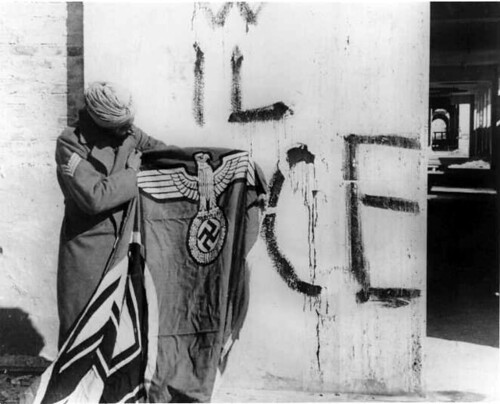
Sikh soldier holds a captured Nazi flag. Circa 1945
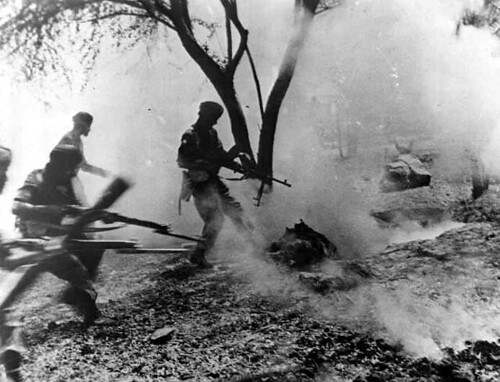
A truly spectacular image. In the heat of the moment - Indian soldiers storm a German trench, after exploding it with hand grenades. Circa 1945.
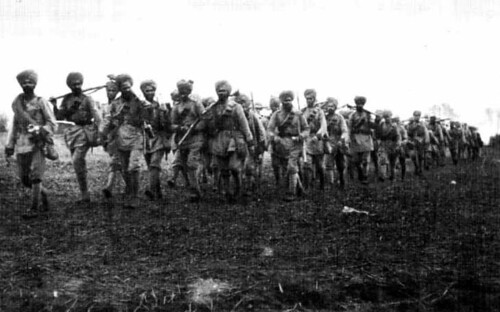
A long way from home: Indian troops at the first Battle of Ypres. This contingent of the 129th Baluchis in the vicinity of the Hollebeke Chateau, 28 October 1914. The photo has been taken by General Gough.
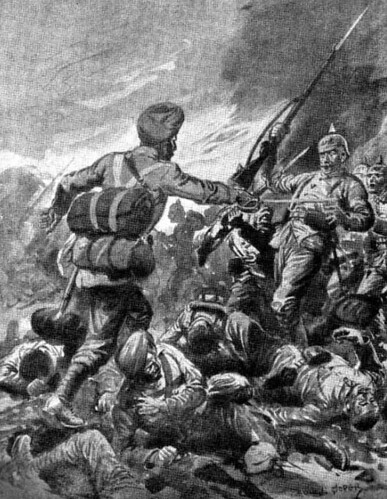
A black & white sketch depicting Havildar Gagna Singh, 57th Wilde's Rifles, in battle. Havildar Singh was awarded the IOM (Indian Order of Merit) by shooting a German officer and killing ten other ranks.
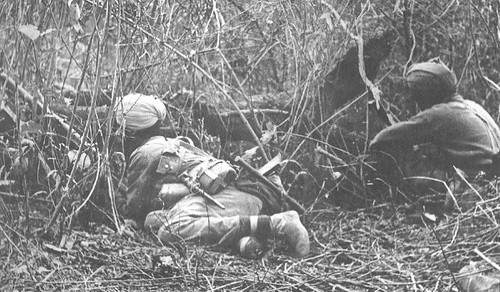
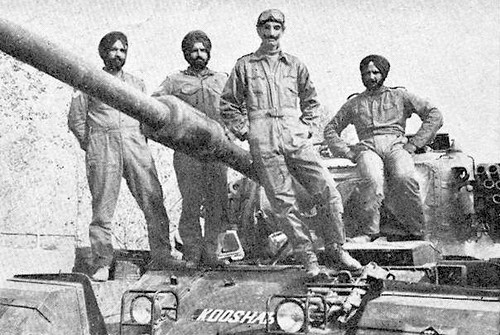
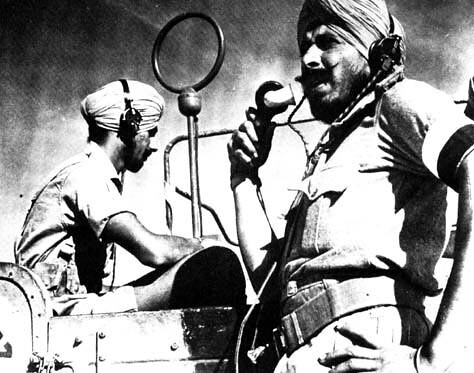
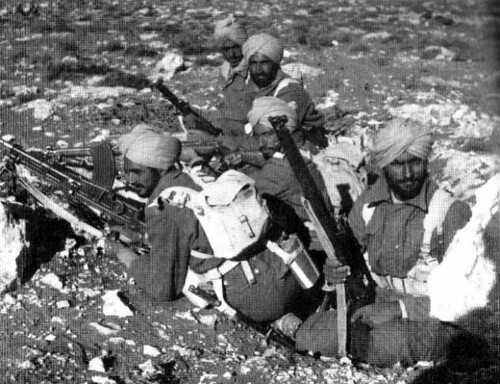
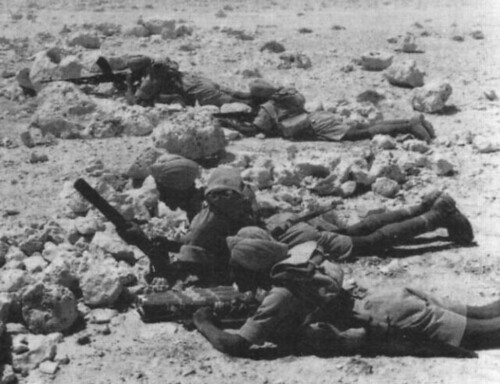
Indian troops, WW-I
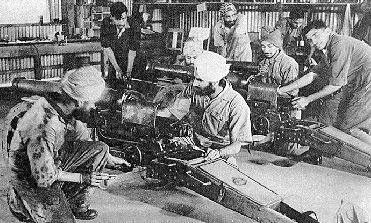
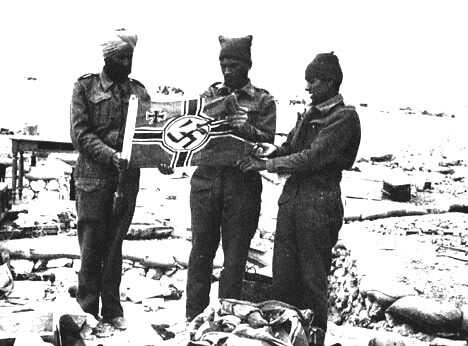
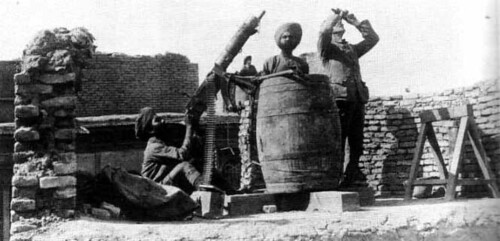
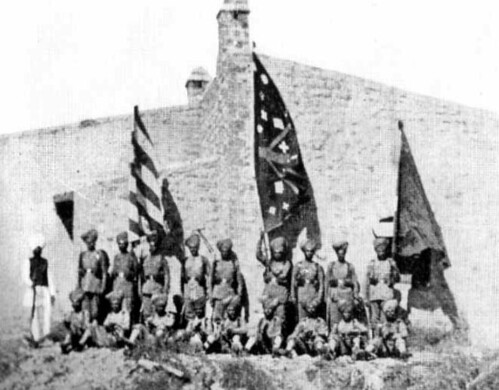
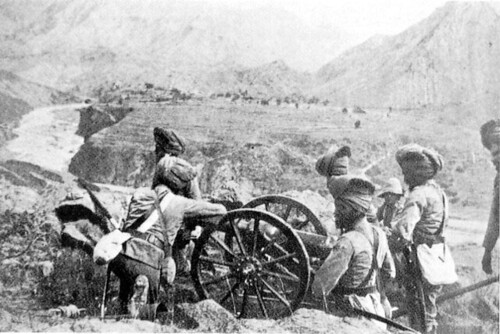
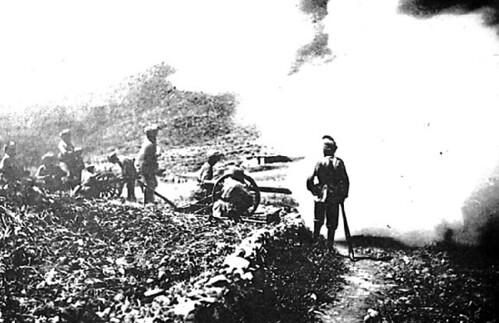
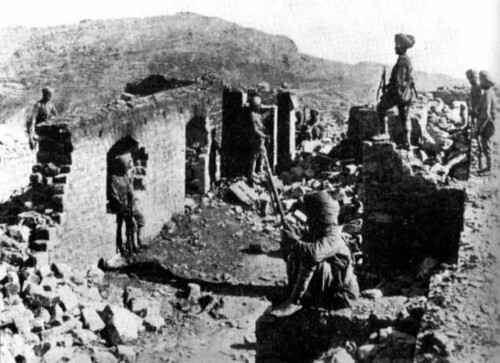
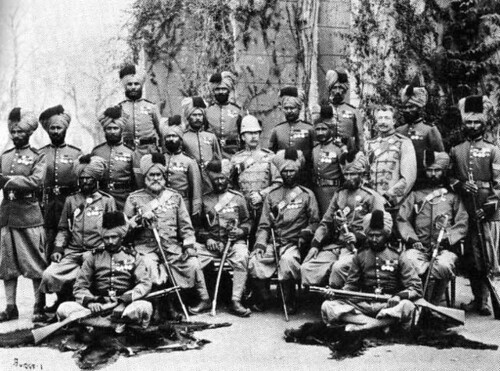
World War I
Sikh Commando
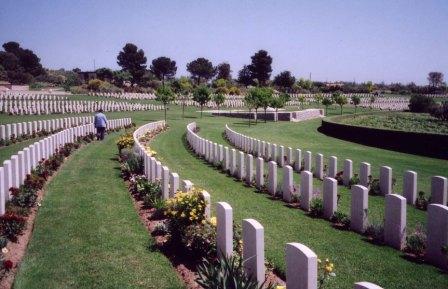
2,197 Sikh war dead buried at Commune of Torino di Sangro, Italy


Indian troops, World War I

Indian soldier in the tank unit on the outskirts of a German village

Indian troops resting after a long day of fighting, Neuve Chapelle, France in summer of 1915.
NEUVE-CHAPELLE MEMORIAL
NEUVE-CHAPELLE MEMORIAL

A French women thanks victorious Indian troops marching through Paris

Fighting for Paris, World War 2
"Singh is King"
Indian troops in Lebanon

Indian troops, Lebanon

A Lebanese Christian women takes a picture of Indian troops enforcing peace in Lebanon
|
'For your tomorrow we gave our today'
|
|||
|
|||
Sixty years ago Britons were celebrating the end of war in Europe, but the war in Asia carried on. The Japanese Army, having overrun much of the British empire in the east, had not surrendered. The Indian Army was the main contingent of the Allied Forces which eventually drove back the Japanese. Mark Tully, the BBC's former India correspondent, has been talking to some of the veterans of that struggle.
http://news.bbc.co.uk/2/hi/programmes/from_our_own_correspondent/4521947.stm
Back home, Churchill seized on the early success of the Chindits, promoting Orde Wingate to Major General and delighting the British public.
But in the end it was sheer firepower that changed the fortunes of the war in Burma; that and the experience and confidence instilled by General Slim.
Japanese bunkers, invulnerable to bombardment, were finally blasted open with high-explosive shells and armour-piercing shells with quick fuses. Increasing control over the air above Burma meant that forward redoubts could be created which could be supplied with stores, fuel and ammunition.
All the time, the Allies were still determined to regain Arakan. After being beaten back twice, they succeeded at the third attempt, where the breathtaking bravery of so many of Slim's men played their part.
A company commander looking for a missing soldier at night bumped into a Japanese patrol. In a frenzy of hand-to-hand combat, he shot one man, then grabbed the little body and swung it round like a flail, knocking his other two assailants off a cliff.
Then there was Umrao Singh, in command of a forward field gun detachment, who came under sustained fire from guns and mortars. Twice wounded, and while firing a Bren gun, he directed the fire of the surviving gun on the target.
He held the gun pit until dawn, and was found face down in the mud surrounded by ten lifeless Japanese soldiers and holding a hand-spike he had used in hand-to-hand combat. Singh survived and was awarded the Victoria Cross.
Years later, living in penury on his Indian smallholding, he was told he could sell his VC for a good price. He replied indignantly that he would never sully the honour of his fallen comrades.
Yet still the Japanese came. The battles of Imphal and Kohima, fought in the spring of 1944 on the far northeastern border of India and Burma against three Japanese divisions, were the decisive battles of the Burma campaign.
Before Imphal, the Japanese general, Mutaguchi, was so confident of Japanese invincibility that he had arranged for 'comfort women' (mostly Korean women forced into prostitution) to be flown in after the victory.
The Japanese hurled themselves with desperate courage on the British positions, but they held firm. Days turned into months.
A Japanese Lieutenant, Taiso Nishikawa, wrote from the front line in his diary: 'If we do manage to capture a position, the enemy bombards it with mortars and bombs it from the air to a heart-shaking degree; so that those who have dug deep trenches are buried in them, and those who have dug shallow have their hands and feet blown away.'
Eventually, when he realised that what remained of his troops were no longer obeying his orders, Mutaguchi broke off the offensive. With 55,000 casualties, Imphal and Kohima represented the largest defeat in Japanese history.
http://www.dailymail.co.uk/news/article-1168185/Revealed-The-terrible-suffering-extraordinary-courage-British-WW2-soldiers-fighting-Japanese-Burmese-jungle.html
World War II Memorial at Garrison Hill, in Kohima, India.
"When You Go Home, Tell Them Of Us And Say,
For Their Tomorrow, We Gave Our Today."

